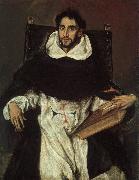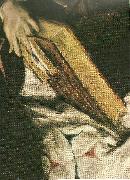Wholesale Oil Painting No Minimum |
|||||||||||
|
|
|||||||||||

|
|||||||||||
|
|
|
||||||||
El GrecoGreek-born Spanish Mannerist Painter, 1541-1614 Considered a representative of late Renaissance Spanish art, El Greco was actually born in Greece, on the island of Crete. After studying in Venice under Titian, El Greco settled in Toledo, Spain in 1577. At the time he was wildly popular, his emotionally religious paintings being just the ticket for the hometown of the Spanish Inquisition. After his death his work was largely ignored until the beginning of the 20th century; now he considered one of the inspired geniuses of Western art. His distinctive style features bold shapes and colors, with elongated and slightly distorted figures. In Toledo El Greco was in constant demand and liked living large: he maintained a private orchestra to accompany his meals. |
||||||||
|
|
||||||||
Fray Hortensio Felix Paravicino
Fray Hortensio Felix Paravicino Painting ID:: 1116 |
1609
Museum of Fine Arts, Boston 1609 Museum of Fine Arts, Boston |
|||||||
|
|
||||||||
El GrecoGreek-born Spanish Mannerist Painter, 1541-1614 Considered a representative of late Renaissance Spanish art, El Greco was actually born in Greece, on the island of Crete. After studying in Venice under Titian, El Greco settled in Toledo, Spain in 1577. At the time he was wildly popular, his emotionally religious paintings being just the ticket for the hometown of the Spanish Inquisition. After his death his work was largely ignored until the beginning of the 20th century; now he considered one of the inspired geniuses of Western art. His distinctive style features bold shapes and colors, with elongated and slightly distorted figures. In Toledo El Greco was in constant demand and liked living large: he maintained a private orchestra to accompany his meals. |
||||||||
|
|
||||||||
|
|
fray hortensio felix paravicino
fray hortensio felix paravicino Painting ID:: 64065 |
painted 1604-9
museum of fine arts, boston painted 1604-9 museum of fine arts, boston |
||||||
|
|
||||||||
|
El Greco Greek-born Spanish Mannerist Painter, 1541-1614 Considered a representative of late Renaissance Spanish art, El Greco was actually born in Greece, on the island of Crete. After studying in Venice under Titian, El Greco settled in Toledo, Spain in 1577. At the time he was wildly popular, his emotionally religious paintings being just the ticket for the hometown of the Spanish Inquisition. After his death his work was largely ignored until the beginning of the 20th century; now he considered one of the inspired geniuses of Western art. His distinctive style features bold shapes and colors, with elongated and slightly distorted figures. In Toledo El Greco was in constant demand and liked living large: he maintained a private orchestra to accompany his meals. fray hortensio felix paravicino painted 1604-9 museum of fine arts, boston |
||||||||
|
|
||||||||
|
Prev Next
|
||||||||
|
|
||||||||
|
Related Paintings to El Greco :. |
||||||||
|
|
||||||||
|
CONTACT US |


